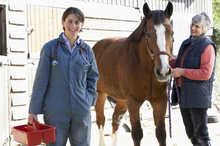The Michigan Department of Agriculture and Rural Development announced two additional cases of Eastern Equine Encephalitis in horses in Calhoun and Van Buren Counties. MDARD was notified by the United States Department of Agricultureâs National Veterinary Services Lab in Ames, Iowa of the results on September 22, 2015.

Protecting horses from infectious diseases
Although fall weather usually brings a decrease in the mosquito population, horse owners need to continue to make sure horses are vaccinated against mosquito borne diseases and disease prevention protocols are in place on their properties.
Both the Calhoun horse and the Van Buren horse had a positive blood test suggesting EEE exposure and had already been euthanized. These horses had not been vaccinated for EEE.
In addition, Wayne County Health officials in New York say that a second horse in Wayne County has died from Eastern Equine Encephalitis. EEE is a rare disease spread by infected mosquitos carrying the virus and can cause inflammation of the brain in horses leading to neurological problems.
In Texas, a recent slew of sample submissions indicative of West Nile virus (WNV) have upped the total number of positive cases in Texas to 19. The Texas A and M Veterinary Medical Diagnostic Laboratory (TVMDL) confirmed the WNV cases via serological test.
Although fall weather usually brings a decrease in the mosquito population, changing conditions can lead to more infectious diseases caused by mosquito bites and horse owners should take precautions to ensure that mosquitoes are kept to a minimum on their properties.
Prevention of mosquito-borne diseases includes draining standing water to keep the pests from multiplying and covering up and using mosquito repellant when outdoors. Here are a few tips:
- Discard old tires, drums, bottles, cans, pots and pans, broken appliances and other items that aren't being used
- Empty and clean birdbaths and pet's water bowls at least once or twice a week
- Protect boats and vehicles from rain with tarps that don't accumulate water
- Wear shoes, socks, long pants and long sleeves if outdoors when mosquitoes are activ
- Apply mosquito repellent to bare skin and clothing. Use mosquito netting to protect children younger than 2 months
- Keep horses and other livestock in protected areas during dusk and dawn hours when mosquitoes are most active
